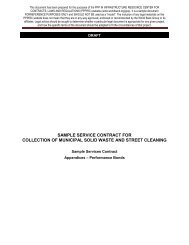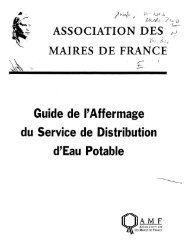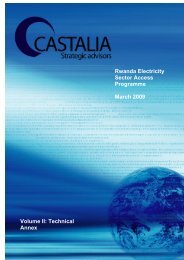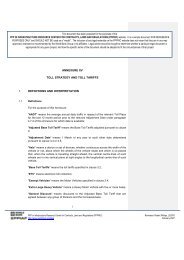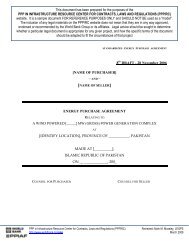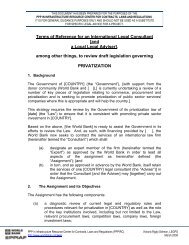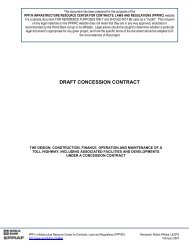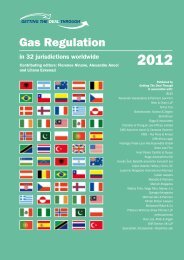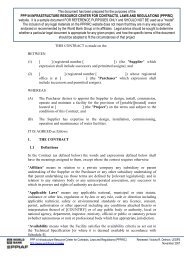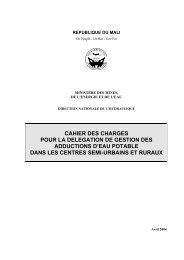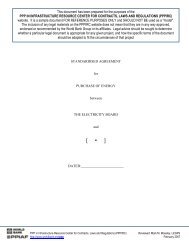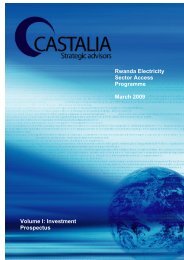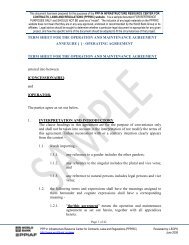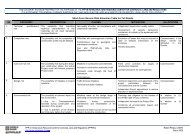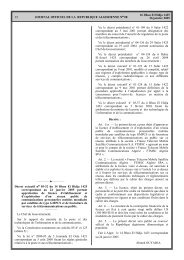water and sanitation concession agreement - example 1 annexures ...
water and sanitation concession agreement - example 1 annexures ...
water and sanitation concession agreement - example 1 annexures ...
Create successful ePaper yourself
Turn your PDF publications into a flip-book with our unique Google optimized e-Paper software.
●<br />
●<br />
●<br />
groups to develop their technical <strong>and</strong> managerial skills.<br />
Use will be made of outside consultants for particular aspects of training.<br />
Equipment manufacturers will be co-opted to provide course material <strong>and</strong> specific<br />
training (eg Chlorine safety) as will technical <strong>and</strong> personnel staff from the the<br />
Operator organisation to cover specific topics.<br />
Respective departmental supervisors will be involved in the practical “on the job”<br />
training following modular course material developed by the Training Manager.<br />
Individual supervisors will also note individuals’ suitability for promotion <strong>and</strong><br />
responsibility <strong>and</strong> their need for training. It will be a function of the supervisor to<br />
pass on to a senior, recommendations for action in these areas.<br />
5. TRAINING REGIME<br />
the Operator will impose an ongoing training regime by providing training for senior<br />
discipline staff <strong>and</strong> the establishment of a training facility in [location].<br />
● The first step will be to determine the need <strong>and</strong> level of training required. In the<br />
case of training staff on the operation <strong>and</strong> maintenance of sewage utilities,<br />
specific rather than general training is desirable where suitable pre-qualified staff<br />
can be identified <strong>and</strong> cross-trained.<br />
● Skill requirements will be established to enable the compilation of job<br />
specifications. Evaluation of potential c<strong>and</strong>idates will proceed once these criteria<br />
have been set.<br />
● The assessment of training needs will be based on the difference between the pretraining<br />
<strong>and</strong> post-training ability required. The training programme will be<br />
scheduled taking into account the extent of necessary skills <strong>and</strong> technology to be<br />
transferred.<br />
5. TRAINING PROGRAMME<br />
●<br />
●<br />
Based on the assessment of training needs, the the Operator will devise a training<br />
programme to be implemented, in co-operation with unions <strong>and</strong> workers, under which<br />
all employees will benefit.<br />
This training programme will include details of the title, duration <strong>and</strong> dates of each<br />
training course <strong>and</strong> will be prepared in conjunction with the employee <strong>and</strong> trainer to<br />
ensure that any confusion or extra work is avoided. Each training programme will<br />
include the following information -<br />
6. ASSESSMENTS<br />
Course Title;<br />
Course Number;<br />
Mechanical / Electrical;<br />
Designation of staff for which the course is designed;<br />
Key elements;<br />
Performance objectives to be achieved to demonstrate competence;<br />
Task Assessment Criteria;<br />
Assessment Forms;<br />
List of Associated Courses;<br />
H<strong>and</strong>outs;<br />
Viewfoils.<br />
16<br />
PPP in Infrastructure Resource Center for Contracts, Laws <strong>and</strong> Regulations (PPPIRC) Reviewed: Victoria R. Delmon, LEGPS<br />
http://www.worldbank.org/ppp November 2007



